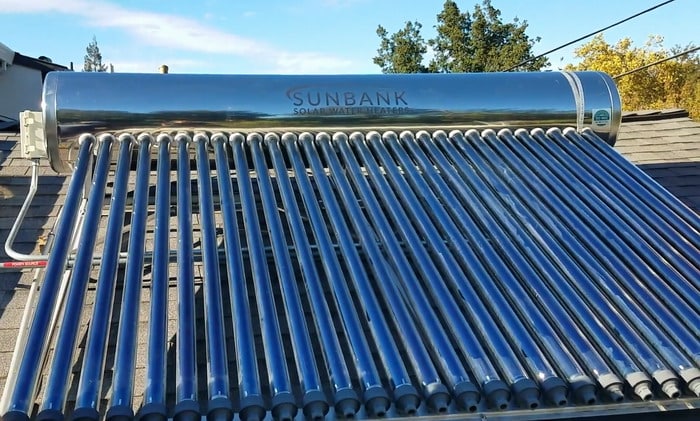How Do Solar Water Heaters Work?

Solar water heaters are an efficient and sustainable way to heat water for a wide variety of applications. These systems utilize the energy from the sun to heat water, reducing energy consumption and providing a reliable source of hot water. In this article, we will explore the various components of a solar water heating system and how they work together to create a renewable energy source.
Components of a Solar Water Heating System
There are two main components to a solar water heating system: the solar collector and the storage tank. The solar collector is responsible for absorbing the energy from the sun, while the storage tank holds the heated water until it is ready for use.
1. Solar Collector
The solar collector is the part of the system that absorbs the energy from the sun and uses it to heat the water. There are two main types of solar collectors: flat-plate collectors and evacuated tube collectors.
Flat-Plate Collectors
Flat-plate collectors are the most common type of solar collector used in residential applications. They consist of a flat, rectangular box with a transparent cover and a dark-colored absorber plate inside. The cover is typically made of glass or plastic, which allows sunlight to enter the collector while trapping the heat inside. The absorber plate is made of a material that is a good conductor of heat, such as copper or aluminum, and is coated with a selective surface that absorbs as much solar energy as possible.
Evacuated Tube Collectors
Evacuated tube collectors are more efficient than flat-plate collectors and are often used in commercial and industrial applications. They consist of a series of glass tubes that are evacuated to create a vacuum, which reduces heat loss. Inside each tube is a copper or aluminum absorber that is coated with a selective surface to maximize solar absorption. The tubes are often arranged in rows or arrays to increase the surface area available for solar absorption.
2. Storage Tank
The storage tank is the part of the system that holds the heated water until it is needed. There are two types of storage tanks: direct and indirect.
Direct Storage Tank
A direct storage tank is a simple, single-tank system that circulates the water through the collector and directly into the tank. These tanks are typically used in warmer climates, where freezing is not a concern.
Indirect Storage Tank
An indirect storage tank is a more complex system that uses a heat exchanger to transfer the heat from the collector to the tank. The heat exchanger is a coil of copper or stainless steel that is located inside the tank and connected to the collector. The fluid used, is usually a glycol/water mixture, which is circulated through the collector and the heat exchanger, transferring the heat to the water in the tank. Indirect storage tanks are often used in colder climates, where freezing is a concern.
How Do Solar Water Heaters Work?
The basic principle behind solar water heating is simple: the sun’s energy is absorbed by the collector, which heats the water in the storage tank. The heated water is then used for showers, washing dishes, or any other application that requires hot water.
Here is a step-by-step breakdown of how a solar water heating system works:
- 1. The sun’s energy is absorbed by the solar collector, which heats the water inside.
- 2. The heated water is pumped or circulated through pipes to the storage tank.
- 3. If an indirect storage tank is used, the heated water passes through a heat exchanger, transferring the heat to the water in the tank.
- 4. The hot water is then available for use in the home.
If the water in the storage tank is not hot enough, a backup heating system, such as an electric or gas heater, can be used to supplement the solar heating.

Flat Panel Solar Water Heater, image source: Pixabay
Benefits of Solar Water Heaters
Solar water heaters are a sustainable and efficient way to heat water for homes and businesses. They are a type of renewable energy technology that uses the energy from the sun to heat water. In this article, we will explore the benefits of solar water heaters and why they are a great investment for anyone looking to reduce their energy bills and their impact on the environment.
Cost Savings
One of the most significant benefits of using solar water heaters is the cost savings. When you use a solar water heater, you can save money on your energy bills by reducing your reliance on electricity or gas. According to the U.S. Department of Energy, a solar water heater can save you between 50% and 80% on your water heating costs. Over time, these cost savings can add up and help you recoup the cost of the solar water heater.
Environmental Benefits
Solar water heaters are a renewable energy technology that harnesses the power of the sun to heat water. This means that they do not produce any greenhouse gas emissions or other pollutants that can harm the environment. By using a solar water heater, you can reduce your carbon footprint and contribute to a cleaner and healthier environment.
Longevity
Solar water heaters are built to last. They are designed to withstand harsh weather conditions and can last up to 20 years or more with proper maintenance. Unlike traditional water heaters that need to be replaced every 8-12 years, a solar water heater can provide hot water for many years without needing to be replaced.
Increased Property Value
Installing a solar water heater can increase the value of your property. A study by the National Renewable Energy Laboratory found that homes with solar water heaters sold for more than homes without them. The study also found that buyers were willing to pay a premium for homes with solar water heaters because they are seen as a sustainable and cost-saving feature.
Energy Independence
By using a solar water heater, you can become more energy independent. This means that you are less reliant on the grid for your energy needs and can reduce your dependence on fossil fuels. This can be particularly useful in areas with frequent power outages or in situations where the grid is unreliable.
Low Maintenance
Solar water heaters are low maintenance and require minimal upkeep. They do not have any moving parts, so there are no parts that need to be replaced or maintained. The only maintenance required is occasional cleaning of the solar panels to ensure that they are free from debris.
Incentives and Rebates
Many governments and utility companies offer incentives and rebates for installing solar water heaters. These incentives can help offset the cost of the solar water heater and make it more affordable. Additionally, some states have tax credits or other financial incentives for installing solar water heaters, further reducing the overall cost.
Conclusion
Solar water heaters are an efficient, sustainable, and cost-effective way to heat water for homes and businesses. They offer a range of benefits, including cost savings, environmental benefits, longevity, increased property value, energy independence, low maintenance, and incentives and rebates. If you are looking to reduce your energy bills, increase your property value, and contribute to a cleaner and healthier environment, a solar water heater may be the perfect solution for you.



